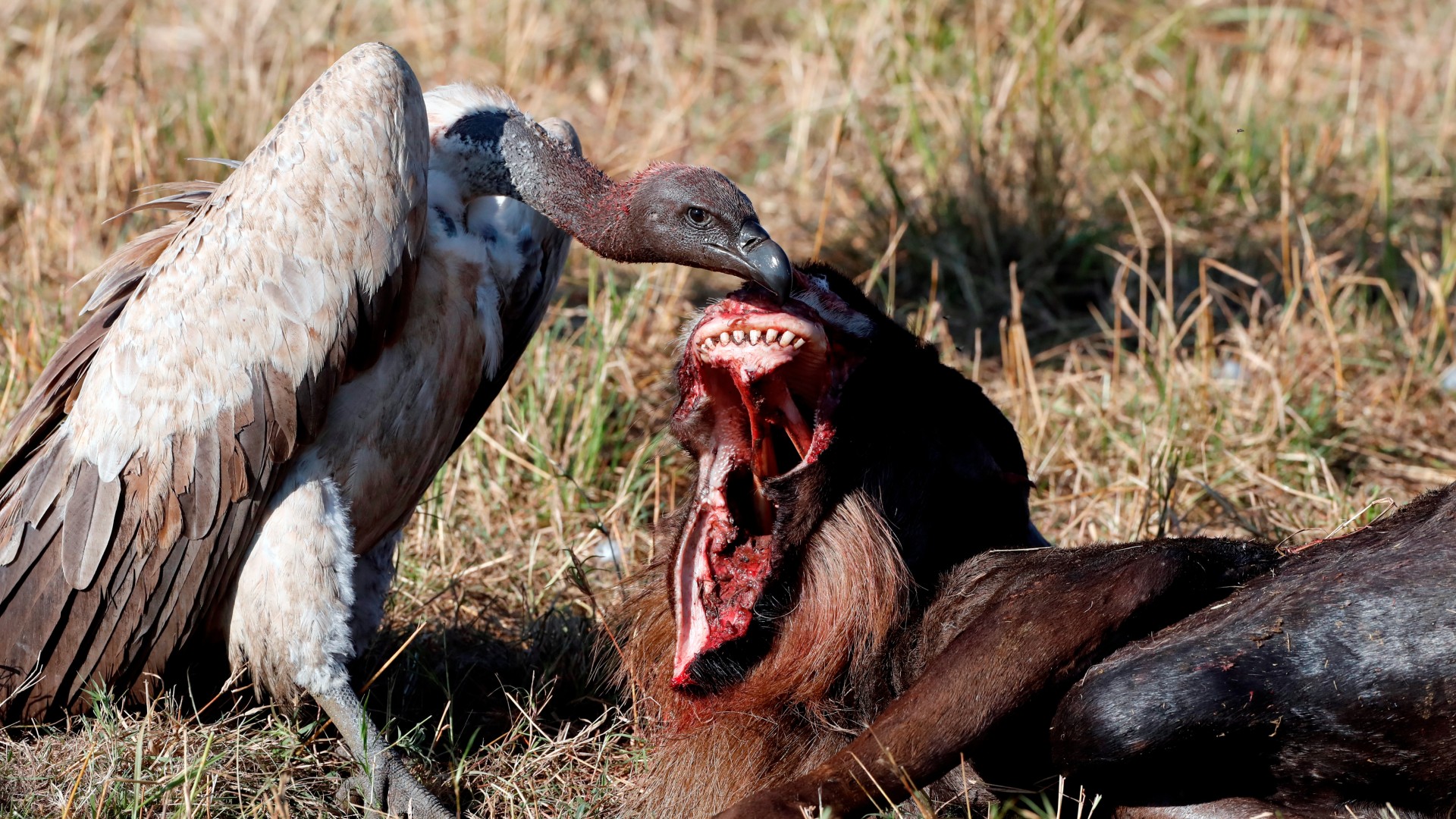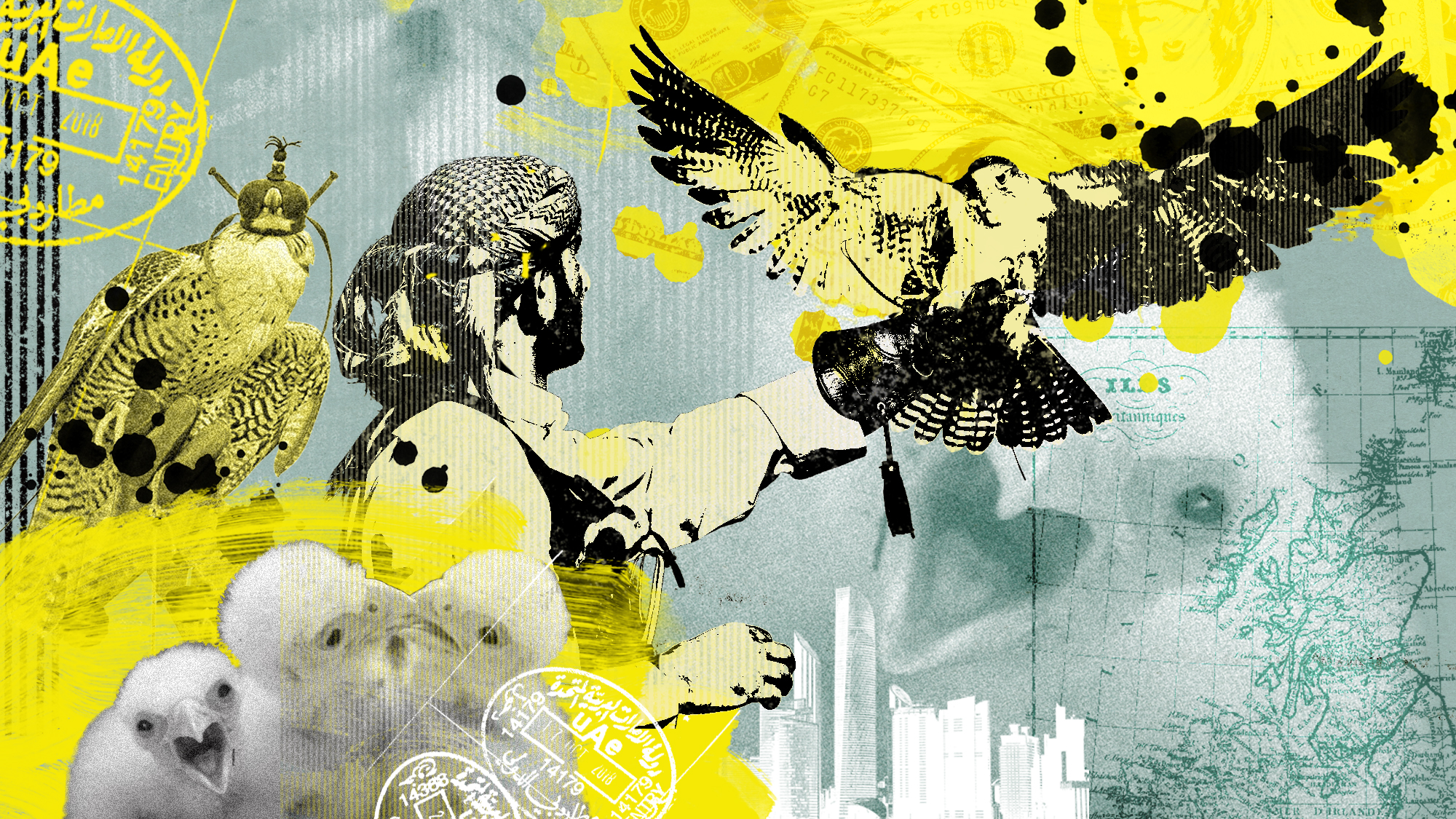How loss of India's vultures might have led to half a million deaths
Near extinction of the invaluable carrion eaters in 1990s left cattle carcasses piled up and disease spreading widely

A free daily email with the biggest news stories of the day – and the best features from TheWeek.com
You are now subscribed
Your newsletter sign-up was successful
Vultures have long evoked images of death, hovering over ailing animals and feeding off their rotting corpses.
But the near extinction of the scavenger birds in India during the 1990s led to the spread of disease-carrying pathogens – and may have killed half a million people, according to a new study.
The working paper, due to be published in an upcoming issue of the American Economic Review, estimates that the related public health crisis between 2000 and 2005 cost the Indian government nearly $70 billion a year.
The Week
Escape your echo chamber. Get the facts behind the news, plus analysis from multiple perspectives.

Sign up for The Week's Free Newsletters
From our morning news briefing to a weekly Good News Newsletter, get the best of The Week delivered directly to your inbox.
From our morning news briefing to a weekly Good News Newsletter, get the best of The Week delivered directly to your inbox.
'Nature's sanitation service'
In India, vultures are a "keystone species", said Science, "essential to the functioning of many of the country's ecosystems".
Unlike mammal scavengers, vultures do not also hunt. They only feed on carrion – and in a country with more than 500 million livestock, they perform a crucial duty of removing disease-ridden carcasses. That also helps to "reduce the populations of other scavengers, such as feral dogs that can transmit rabies".
The birds were once widespread in India, acting as "nature's sanitation service", said The Economist. They are also highly efficient. "A group of vultures can polish off a cow's carrion in 40 minutes."
But in 1994, farmers began giving their livestock a painkiller called diclofenac. When they disposed of dead livestock, the vultures who fed on the carcasses were poisoned by the anti-inflammatory drug, dying within weeks.
A free daily email with the biggest news stories of the day – and the best features from TheWeek.com
In one decade, India's vulture population fell from 50 million birds to just a few thousand: the fastest population collapse of a bird species in history. The worst-hit species, the white-rumped vulture, "declined by a dreadful 99.9%" between 1992 and 2007", said Bird Guides.
Cattle bodies piled up around tanneries and fields "became carcass dumps" for feral dogs and rats, said Science, leading to the spread of disease. The government also forced tanneries to use chemicals to dispose of the carcasses, which caused toxic substances to "leach into waterways used by people".
The vulture wipeout was later attributed to diclofenac, and India banned the use of the drug in 2006. Pakistan and Nepal followed suit. But India's vulture population is unlikely to ever completely recover.
The human cost of vulture wipeout
Anant Sudarshan, an environmental economist at the University of Warwick, witnessed the crisis growing up in India. Sudarshan, and Eyal Frank of the University of Chicago, co-authors of the upcoming American Economic Review paper, compared maps of vulture habitats to health records for more than 600 Indian districts between 2000 and 2005.
In districts that were "highly suitable to vultures", there was an average increase in human deaths of 4.2%. That implies about 104,386 additional deaths each year, or half a million in total. Previous research had calculated that India would spend roughly $665,000 to save one life. The economic damage, according to the team's estimates, was about $70 billion per year.
"This [upcoming paper] will be a classic in the field," said Atheendar Venkataramani, a health economist at the University of Pennsylvania. It could also convince lawmakers to "push forward policy and conservation measures", said Andrea Santangeli, a conservation scientist at the Institute for Mediterranean Studies.
"Scientific evidence suggests the Earth is undergoing a mass extinction of species, caused by human activity," said Sudarshan and Frank. "Evaluating the social costs of losing non-human species is necessary to manage biodiversity and target conservation resources."
Traditional Zoroastrian burial rites are also becoming "increasingly impossible to perform" because of the decline in vultures, said The Guardian. Parsi communities in India and Pakistan have for thousands of years placed their dead on top of dakhma, or "towers of silence", built above the soil to prevent contamination. Vultures "eat the flesh on the bones", which are later collected in an ossuary pit.
Offering the body to the birds is "the devout Zoroastrian's ultimate act of charity", one Karachi resident told The Guardian. The vulture's eye is believed to help the soul's transition. But there are only two remaining towers of silence in Karachi, Pakistan's largest city. "We've lost a way of life, our culture," said one resident.
This year, there are "signs of stabilisation" among India's critically endangered vultures, said Bird Guides – but they are "still in a precarious situation".
Images of their "blood-splattered bills" tend to "evoke less sympathy" than "majestic tigers, adorable pandas" or other staples of wildlife conservation campaigns, said The Economist: animals that "tug at human heartstrings".
But "conserving these animals should be a priority. They may not be cute or cuddly, but they are important."
Harriet Marsden is a senior staff writer and podcast panellist for The Week, covering world news and writing the weekly Global Digest newsletter. Before joining the site in 2023, she was a freelance journalist for seven years, working for The Guardian, The Times and The Independent among others, and regularly appearing on radio shows. In 2021, she was awarded the “journalist-at-large” fellowship by the Local Trust charity, and spent a year travelling independently to some of England’s most deprived areas to write about community activism. She has a master’s in international journalism from City University, and has also worked in Bolivia, Colombia and Spain.
-
 Why are election experts taking Trump’s midterm threats seriously?
Why are election experts taking Trump’s midterm threats seriously?IN THE SPOTLIGHT As the president muses about polling place deployments and a centralized electoral system aimed at one-party control, lawmakers are taking this administration at its word
-
 ‘Restaurateurs have become millionaires’
‘Restaurateurs have become millionaires’Instant Opinion Opinion, comment and editorials of the day
-
 Earth is rapidly approaching a ‘hothouse’ trajectory of warming
Earth is rapidly approaching a ‘hothouse’ trajectory of warmingThe explainer It may become impossible to fix
-
 As temperatures rise, US incomes fall
As temperatures rise, US incomes fallUnder the radar Elevated temperatures are capable of affecting the entire economy
-
 Climate change could lead to a reptile ‘sexpocalypse’
Climate change could lead to a reptile ‘sexpocalypse’Under the radar The gender gap has hit the animal kingdom
-
 Why scientists want to create self-fertilizing crops
Why scientists want to create self-fertilizing cropsUnder the radar Nutrients without the negatives
-
 The former largest iceberg is turning blue. It’s a bad sign.
The former largest iceberg is turning blue. It’s a bad sign.Under the radar It is quickly melting away
-
 Why the Middle East is obsessed with falcons
Why the Middle East is obsessed with falconsUnder the Radar Popularity of the birds of prey has been ‘soaring’ despite doubts over the legality of sourcing and concerns for animal welfare
-
 How drones detected a deadly threat to Arctic whales
How drones detected a deadly threat to Arctic whalesUnder the radar Monitoring the sea in the air
-
 ‘Jumping genes’: how polar bears are rewiring their DNA to survive the warming Arctic
‘Jumping genes’: how polar bears are rewiring their DNA to survive the warming ArcticUnder the radar The species is adapting to warmer temperatures
-
 Crest falling: Mount Rainier and 4 other mountains are losing height
Crest falling: Mount Rainier and 4 other mountains are losing heightUnder the radar Its peak elevation is approximately 20 feet lower than it once was